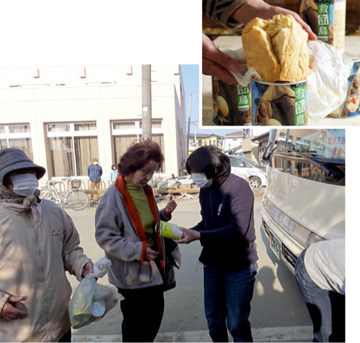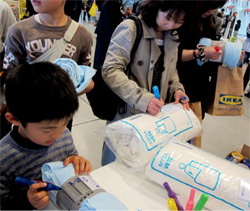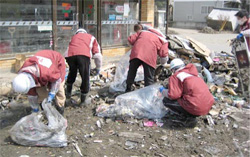Home > Highlighting JAPAN > Highlighting Japan MAY 2011 > Companies Hold Firm to Boost Recovery
Highlighting JAPAN
COVER STORY: The Road to Recovery
Companies Hold Firm to Boost Recovery
The government, NGOs and NPOs aren't the only ones assisting with the recovery process after the Great East Japan Earthquake. Companies are putting their specialist skills to good use and lending a hand too. The Japan Journal's Osamu Sawaji takes a look at three such companies.

NGO members distribute Canned Bread in Ishinomaki, Miyagi Prefecture, April 10. Inset, Pan Akimoto's Canned Bread
Credit: COURTESY OF PAN AKIMOTO, TADASHI AIZAWA
Pan Akimoto
On March 11, everything started to shake violently at Pan Akimoto, a bakery based in Nasushiobara in Tochigi Prefecture. Books and paperwork were strewn from people's desks in the office and the gas ovens in the bread factory shifted, severing their gas pipes. The following day, once the factory had been safely restored, the company's president Yoshihiko Akimoto gave the order to go ahead with full production.
"Our Canned Bread was developed after the experience of the Great Hanshin-Awaji Earthquake in 1995 and was used by a great many people following the Niigata Chuetsu Earthquake in 2004," explains Akimoto. "So I just knew that the victims of the earthquake would need large quantities of Canned Bread this time round too."
With a shelf life of up to three years, Pan Akimoto's Canned Bread enables people to eat soft bread any time they like, just by opening a can. As products are canned, there is no risk of the bread being crushed or getting damp, making it easier to transport and store. In the past, in addition to being purchased as part of emergency food supplies by individuals, local governments, companies and schools, Canned Bread has also been sent overseas via NGOs as part of relief supplies, following the quakes in Sumatra in 2005 and Haiti in 2010.
In the immediate aftermath of the Great East Japan Earthquake, Akimoto donated approximately 10,000 cans that the company had in stock to the affected area. As a member of an employers' association, he also called on his fellow members for financial support to enable the company to keep on sending bread to the affected area. With members using Twitter and other social networking services to spread information, the scope of funding increased in the blink of an eye. Through his contacts, Akimoto got other companies to deliver bread to the affected area, where the NGO Japan International Food for the Hungry (JIFH), of which Akimoto is a member, stepped in to distribute bread on a local level.
"We had a network up and running, with people making bread, raising funds, delivering bread and distributing bread on the ground, within about four days of the earthquake," says Akimoto.
Akimoto also sent letters out to customers who had purchased Canned Bread prior to the earthquake, encouraging them to return any unused to the company at customer expense, accompanied by a message to the victims of the earthquake. In response, Pan Akimoto was inundated with over 7,000 cans, with a whole range of messages written on them.
Continuing along the same lines, the company has been delivering Canned Bread to the affected area every three to four days ever since the earthquake. The total number of cans currently stands at over 40,000.
"So many people pitched in to lend a hand. We would never been able to do as much on our own, as a single company," says Akimoto. "It really feels like that sense of kindness and consideration for others has become ingrained in the Japanese people."

Customers in IKEA Kobe in Hyogo Prefecture write messages for victims of the earthquake on packages of blankets.
Credit: COURTESY OF IKEA JAPAN
IKEA
The earthquake on March 11 also rocked the Funabashi branch of IKEA, the Swedish furniture giant with stores all over the world, in Chiba Prefecture. Fortunately, all of the customers in the store were evacuated by members of staff and escaped unharmed. The area around the store however experienced liquefaction, causing water to gush up through the ground. Power was cut off to the entire area, including the store, and the trains stopped running as the aftershocks continued, forcing large numbers of people to congregate at evacuation shelters set up at local schools and community centers. Around 150 employees from IKEA's Funabashi store came to their assistance however, providing evacuation shelters with supplies in stock at the store, including blankets, water and chocolate, free of charge.
"There's no manual to follow in situations like that, but our corporate philosophy is 'a better everyday life for many people,' so I think activities like that just happened naturally," comments Chiharu Ohata, PR and international communications manager for IKEA Japan.
The following day, IKEA Japan started to look into assistance for people affected by the earthquake in the Tohoku region and on March 15 sent out its first shipment of emergency relief supplies, consisting of around 4,500 blankets to help fend off the bitter cold in the affected area, to Kesennuma in Miyagi Prefecture. The company continued to send supplies to the affected area after that, carefully selecting items in stock that would be of most use, including towels, potato chips and bottled water.
IKEA Japan called on NGOs with plenty of experience with international emergency relief operations, including Peace Winds Japan and Vision Japan, to deliver and distribute supplies in order to get them to areas that weren't receiving sufficient public assistance as quickly as possible. The company also worked with organizations providing support for children in the affected area, such as Save the Children and the Japan Committee for UNICEF, to send out items such as stuffed animals and wooden toys.
"We weren't sure whether sending out stuffed animals would be of any use, so it came as a great relief when we heard how happy it had made children in the evacuation shelters," says Ohata. "As a company, we believe that the home is the most important place in the world, and that children are the most important people in the world. I think we managed to provide assistance in that same spirit."
IKEA Kobe in Hyogo Prefecture and IKEA Tsuruhama in Osaka Prefecture meanwhile began to sell products such as mattresses, blankets, cushions and torches at half price, as part of a relief campaign whereby customers could purchase such items and send them to the affected area. As the area is home to many people who experienced the Great Hanshin-Awaji Earthquake in 1995, many of the relief packages sent out contained messages of support and encouragement for those affected by the Great East Japan Earthquake.
IKEA Japan has also started to donate everyday items such as saucepans, frying pans, dishes and tables to help cope with the increase in temporary housing.
"We are hoping to open an IKEA store in Tohoku in the future, so that we can help by creating jobs for local people," says Ohata.

Staff from Seven-Eleven Japan headquarters clear rubble from in front of a Seven-Eleven store in Tohoku, as they strive to get their operations back in full working order.
Credit: COURTESY OF SEVEN & i HOLDINGS
Seven & i Holdings
One of the first companies to start providing assistance in the area affected by the earthquake was Seven & i Holdings, which affiliates Seven-Eleven Japan with its nationwide network of approximately 13,000 convenience stores. It delivered 30,000 two-liter bottles of mineral water by truck and 1,000 sweet bread rolls to the disaster headquarters in Miyagi Prefecture by helicopter the day after the quake, and continued to deliver items such as rice, blankets and bananas to the affected area after that. As part of a preexisting agreement with Iwate Prefecture to provide clothing, bedding and other essential supplies in the event of a disaster, the company also supplied approximately 540,000 items of clothing at the prefecture's request, including coats, sweaters and shoes.
The earthquake and subsequent tsunami forced Seven-Eleven convenience stores to close approximately 600 of its 1,400 stores in the area. From March 15 onwards, around 300 members of staff from Seven-Eleven Japan were dispatched to these stores to clean up and get things back in order so they could reopen. In order to make up for product shortages, with facilities such as food processing plants and delivery centers in particular affected by the earthquake, the company also set up a backup network to deliver products via undamaged plants.
"Your top priority in the retail industry is always to keep your stores open. If you are forced to close your stores for some reason, you need to set about getting them open again as quickly as possible," explains Kazuo Ozaki from Seven & i Holdings' CSR Department. "Owners and employees of each local store also did everything they could to restore the daily life of customers."
Despite being flooded by the tsunami, one store in Ishinomaki, Miyagi Prefecture, still managed to open the next day. Although many customers came to the store, the lack of electricity meant that the cash registers were out of action, making it impossible to read prices of goods by barcode. Therefore, the store staff gave customers pens and pieces of paper and introduced a self-certification system whereby customers wrote down product prices displaying the store shelves for themselves. Then, the store staff received a paper and calculated the total prices by a calculator. Stores in Tokyo meanwhile doubled as evacuation shelters for people who were unable to return home due to suspended rail services.
"Lots of customers in the affected area told us how reassuring it was to see our stores open," says Ozaki. "Nothing makes us happier than hearing comments like that."
Some 90% of the Seven-Eleven stores that had to close were up and running again by early April.
© 2009 Cabinet Office, Government of Japan






